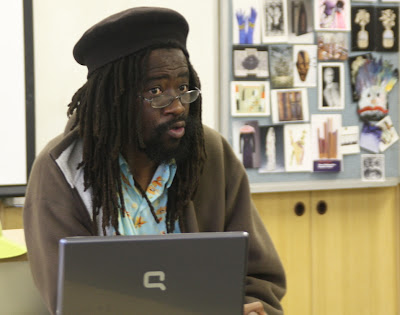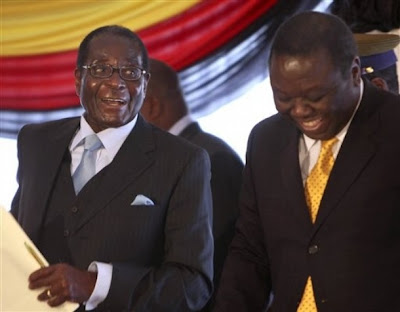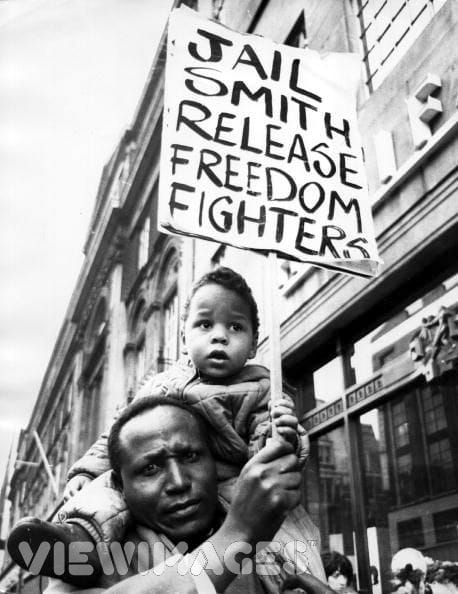Zimbabwe
The ‘mubaraking’ of Gaddafi, Maliki, Mugabe and others

By Patrick Bond
February 27, 2011 – Links International Journal of Socialist Renewal -- The late South African anti-apartheid poet-activist Dennis Brutus occasionally used “Seattle”, the name of a city in the northwestern United States, as a verb. We should “seattle Copenhagen”, he said in late 2009, to prevent the global North from doing a climate deal in their interests, against Africa’s.

46 arrested activists charged with treason, tortured
February 25, 2011 -- It has now been confirmed that detained labour movement activist and leading member of the International Socialist Organization Zimbabwe Munyaradzi Gwisai (pictured) and 45 other activists detained by the Zimbabwe state on February 19 have been charged with treason. If found guilty of treason, the activists risk a sentence of death or life imprisonment. They are being tortured to extract bogus confessions. The arrests followed a raid on a closed meeting that was discussing the implications of the revolutions in the Arab world. Gwisai is director of the Labor Law Centre and former Movement for Democratic Change (MDC) MP.
Crisis in Zimbabwe -- a long walk to freedom! Latest issue of ISO Zimbabwe's `Socialist Worker'

Robert Mugabe (centre) and GNU partners Morgan Tsvangirai (left) and Arthur Mut
A mid-2011 election announced by Mugabe promises a return to outright violence and poll thievery.
By Patrick
Bond, Bulawayo
November 12, 2010 – Links International Journal of Socialist Renewal – If leaders of a small African country stand up with confidence to imperialist aggression, especially from the US and Britain, it would ordinarily strike any fair observer as extremely compelling. Especially when the nightmare of racist colonialism in that country is still be to exorcised, whites hold a disproportionate share of economic power and state’s rulers appear serious about changing those factors.
Zimbabwe: Liberation nationalism, old and born again

Zimbabwe: Struggle, dictatorship and the response of the social movements
By Leo Zeilig
June 28, 2010 – Zimbabwe’s economy has been in free fall. Between 2000 and 2005, the economy contracted by more than 40 per cent. Today GDP per capita is estimated to be the same as it was in 1953. Before the replacement of the Zimbabwe dollar with the US dollar and the South African rand in 2009, the country had the highest inflation rate in the world, soaring to 165,000 per cent in February 2008.
South Africa: FIFA, not migrants, are the real tsotsis

By Patrick Bond, Durban
June 25, 2010 -- South Africa's soccer-loving critics have long predicted the problems now growing worse here because of its World Cup hosting duties:
- loss of large chunks of government’s sovereignty to the world soccer body FIFA;
- rapidly worsening income inequality;
- future economic calamities as debt payments come due;
- dramatic increases in greenhouse gas emissions (more than twice Germany’s in 2006); and
- humiliation and despondency as the country’s soccer team Bafana Bafana (ranked #90 going into the games) became the first host to expire before the competition’s second round.
Soon, it seems, we may also add to this list a problem that terrifies progressives here and everywhere: another dose of xenophobia from both state and society.
The crucial question in coming weeks is whether, instead of offering some kind of resistance from below, as exemplified by the Durban Social Forum network’s 1000-strong rally against FIFA on June 16 at City Hall, Durban, will society’s sore losers adopt right-wing populist sentiments, and frame the foreigner?
The legacy of anti-colonial struggles in Southern Africa: Liberation movements as governments

SWAPO's Sam Nujoma.
By Henning Melber
Southern Africa: The liberation struggle continues

[The following is the editorial in the latest edition of AfricaFile's At Issue Ezine, vol. 12 (May-October 2010), which examines the development of the southern African liberation movement-led countries. It has been posted at Links International Journal of Socialist Renewal with permission.]
By John S. Saul
Zimbabwe: Despite Mugabe's opportunism, radical land reform is necessary

Mugabe and reconciliation: The genesis and meaning of `We Are All Zimbabweans Now'
By James Kilgore
[This paper was presented to the Center of African Studies, University of Illinois, Champaign-Urbana, on February 3, 2010. It is posted at Links International Journal of Socialist Renewal with James Kilgore’s permission.]
